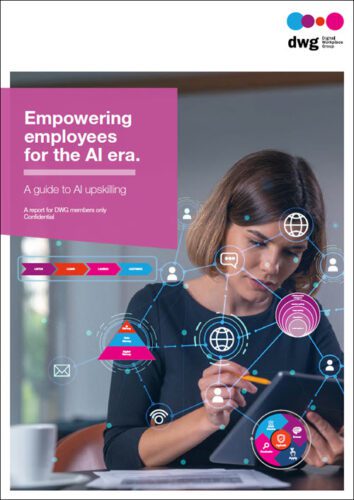From fast-tracking findability to the intranet and Microsoft Viva – DWG’s 2022 Research Programme is here!
The votes are counted and the research briefs are already being written – it’s that time of year when we decide and announce the topics that DWG will cover in its latest annual Research Programme. You can see all the details in the new fact sheet for the programme.
DWG’s Deputy CEO, Nancy Goebel, says: “With the pandemic elevating the digital workplace to the essential workplace, DWG’s 2022 research programme will help the world’s leading practitioners fast-track efforts to build resilience for both the unexpected and the expected.”
DWG members tell us that they use our research to help shape strategy, grow team knowledge, validate thinking and ideas, prepare for new projects, and gain credibility internally. In fact, 82% of members say that access to research and case studies is one of the best things about their membership.
In 2022, we’ll explore the following topics in depth, extending our ongoing research streams around areas such as: content, findability and collaboration – as well as delving into Microsoft Viva, getting food for thought on the inclusivity of the digital workplace, and more!
DWG’s 2022 Research Programme
Modern intranets in times of Microsoft Viva/ Teams: How it all comes togetherThis report will help intranet and digital workplace teams ensure that Viva/Teams/intranet come together in an optimal way to deliver the best possible digital employee experience with multiple front doors that help employees get what they need within the flow of their work. |
The Findability Playbook: Bringing together all the critical elementsOver the last decade, DWG Research Programme has regularly covered a range of aspects of findability, including insights into enterprise search and content management. This new, in-depth report will be our broadest look yet at the topic of findability and the elements that are needed to get it working optimally. |
Getting content and information right: User-centric content and design practicesThis research report will provide DWG members with an overview of the key user-centric content and design practices – including how and when to best use them and illustrated the with examples from the field. |
Enterprise Social Network evolution: Intranet 2.0 a decade and a half onA decade and a half on from the dawn of ‘Enterprise 2.0’ this report will examine how ESNs have been adopted (or not) by organisations, the extent to which they’ve changed how we work, and how they’ve continued to evolve. |
The inclusive, ethical digital workplace: How to promote accessible, diverse, inclusive experiencesThis report will look at approaches that promote accessible, diverse, inclusive digital workplace experiences that foster flourishing and wellbeing for all employees. It will consider real world examples and practical advice for getting started, providing digital workplace practitioners with a primer on key elements. |
What digital workplace teams can learn from the DWG awards: 5 year trendsIn this paper we’ll surface highlights and trends from 5 years of DWG’s awards, sharing best practice knowledge of what it takes to create a successful digital workplace and be a great digital workplace leader. |
Download the 2022 DWG Research Fact Sheet to learn more about our research programme and the new topics on the roster for the year ahead.
DWG’s Director of Research, Elizabeth Marsh commented: “This year’s programme is a real balance of core practice areas like content and findability, as well as thought leadership such as looking at how to make the digital workplace inclusive and ethical. We’ll also be exploring the relationships between the intranet and Microsoft Viva and Teams which is a hot topic for our members right now. I’m personally excited that we’ll be sharing insights and trends from the first five years of the DWG Awards as part of this year’s programme.”
2022 Research Programme

BECOME A DWG MEMBER
Categorised in: → Microsoft Viva, Digital workplace technologies, Research reports

